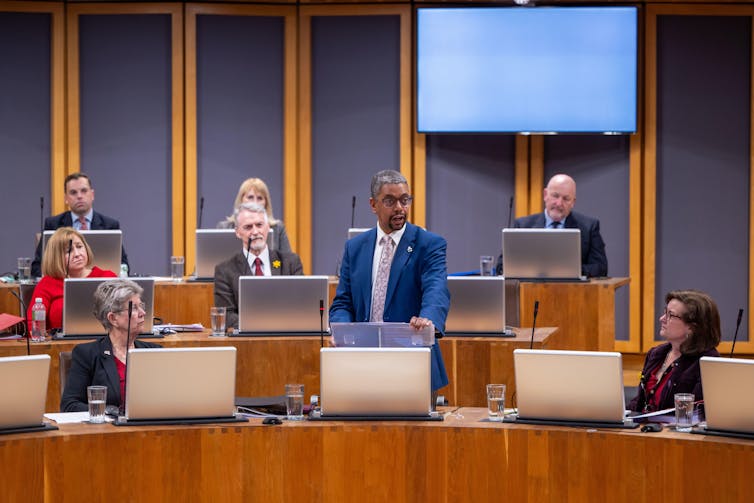Keir Starmer could be forgiven for thinking that he wouldn’t have to worry about Wales in the upcoming election. Labour’s dominance stretches back for more than a century, and the party has led every government since devolution in the 1990s. The next month will therefore have looked fairly straightforward for Labour election HQ.
However, as the election campaign was getting underway, the Welsh Labour first minister, Vaughan Gething, lost a confidence vote in the Senedd. This was the culmination of months of controversy over a £200,000 donation Gething received from a company whose owner had been convicted of dumping waste on the Gwent Levels.
Gething and his allies have insisted that the vote was a Tory gimmick organised as part of their election tactics. The vote was non-binding, and Gething is adamant that he will not resign. While unlikely to have a major impact on Labour’s general election results in Wales, Starmer and his team could do without troubled waters in Cardiff Bay.
This is a crisis not seen in Welsh Labour for quite some time. The Marxist theorist Antonio Gramsci distinguished between crises that give rise to “political criticism of a minor, day-to-day character” and those that lead rise to “socio-historical criticism” beyond the political world.
While a crisis centred on the first minister might appear to fall into the first category, it could yet prove symptomatic of something deeper at play.
Labour has risen to dominance in Wales by successfully articulating the interests of several different groups at once. The party has positioned itself as the defender of working-class interests, often by using radical language and reminding voters of its strong links to Labour traditions – particularly Nye Bevan, who led the creation of the NHS.
It also positions itself as the party of Wales, appealing to voters in terms of both identity and class. Former first minister Mark Drakeford once declared that “social solidarity is part of what it means to be Labour, and what it means to be Welsh”.
Yet, sustained single party dominance has negative consequences. As noted by the political scientist TJ Pempel, the dominant party can shape the nation and political landscape in its own image, but a failure to adapt can sow the seeds for its own destruction.
Welsh historian Gwyn Alf Williams complained in the 1980s that Labour dominance in Wales had hardened into an oligarchy “characterised by accommodation snug within the system”. Williams argued that, with its politicians “dependent on the support and manipulation of powerful trade unions”, the party was falling into corruption and nepotism.

Gething did not break any rules in accepting the campaign donation. But a link with such a businessperson, as well as the controversial union machinations that took place during the leadership contest that delivered Gething to power, suggests a party detached from the electoral base that sustains it.
It also speaks to the difficulties Welsh Labour has in reconciling its pro-business positioning with its radical rhetoric. Add to this changing demographics, significant poverty and struggling public services, and the crisis might run deeper than a single politician and his campaign donations.
One suspects that the longer Gething tries to ride this out, the worse things might become for both himself and Welsh Labour. What appears to be a minor crisis could lead to a longer-term weakening of the party’s electoral base.
Labour in the Senedd and Westminster
Labour has emphasised that the upcoming election represents an important opportunity for Wales. Gething has argued that having two Labour governments, one in Westminster and the other in the Senedd, will allow the Welsh government to achieve its ambitions.
But even here there is the risk of potential tension. Starmer has been clear that a Labour government will not be able to turn on the spending taps. Welsh Labour might claim that having a Labour government both in Cardiff and Westminster will be beneficial, but if the money doesn’t come, where then does the blame lie for poor government performance?
If Welsh Labour is seen as not defending Wales’ interests, will voters look for alternatives? Will Plaid Cymru capitalise and successfully capture voters from Welsh Labour’s voting coalition?
Like the rest of the country, polling suggests near annihilation for the Tories in Wales on July 4. But this masks a more complex picture underneath. Labour is potentially underperforming in Wales compared to the rest of the UK. The extent to which this is a blip or a long-term trend remains to be seen, but the SNP’s fate in Scotland shows that a once dominant party can collapse fairly rapidly. Even before the SNP, Scottish Labour’s own history – from dominance to defeat – is indicative of how longer-term success can be eroded.
It is unwise to write off Labour in Wales, especially ahead of a general election that looks set to see it grow. But after July 4, Gething cannot afford to waste time. His first priority must be reclaim the front foot. If he is unable to inspire confidence, what is currently only an immediate crisis could spiral into far-reaching consequences for Labour in Wales.

